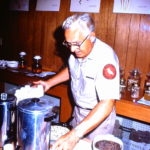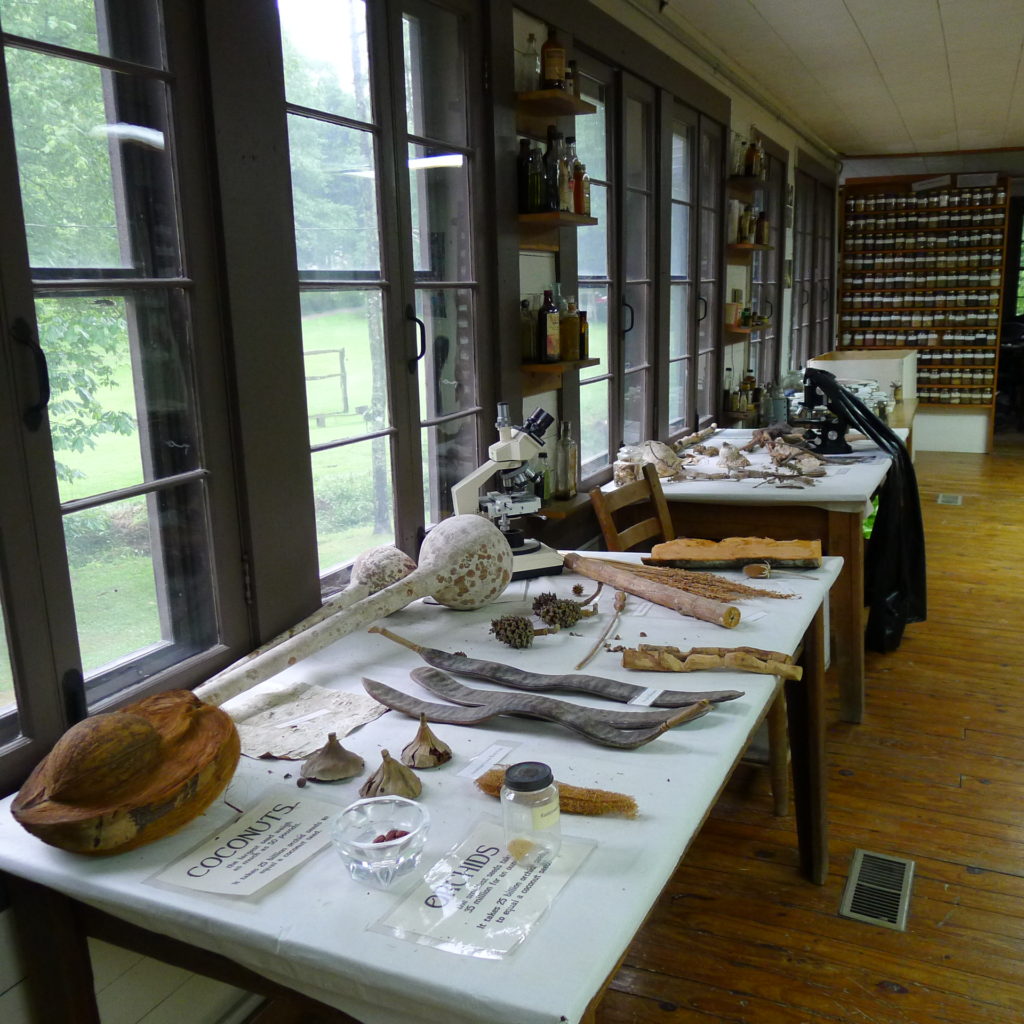Pine Mountain Settlement School
Series 23: E. J. CARR BOTANICAL COLLECTIONS
Guide
Ellwood Jerome Carr, Naturalist (1910-2005)

Ellwood J. Carr Botanical Specimens. [1130953.jpg]
TAGS: E. J. Carr Plant Center Guide, Ellwood Jerome Carr, “Bud” Carr, donations, instructional materials, Environmental Education Program, Girls Industrial Building, Plant Center, naturalists, botany
E. J. CARR PLANT CENTER Guide
The original location of the Plant Center was the Girls Industrial Building, Pine Mountain Settlement School. The E. J. Carr library collections were relocated to the Library Archive (Boys House) in 2018 at the request of then PMSS Director, Goeff Marietta. The specimens and other physical materials, including the large pressed holding and the medicinal and herbal physical collections, remain in the Plant Center (Girls Industrial/Industrial Kitchen).
E. J. CARR PLANT CENTER Arrival at PMSS
The Ellwood J. Carr Plant Center Collections came to Pine Mountain in 1984. Carr, an amateur botanist and naturalist, was familiar with the Environmental Education (EE) program at Pine Mountain Settlement School, and, nearing retirement from a lifetime of commitment to all things botanical, he wished to support the growing environmental programming at Pine Mountain Settlement.
Carr’s very large collection, comprised of specimens, inventories, historical materials, slides and photographs, and an extensive book collection, was first housed with other instructional materials for the use of the Environmental Education Program in the former Girls Industrial Building, now commonly called the “Plant Center” and the “Industrial Kitchen.” The Collection for many years formed the backbone of botanical instruction in the EE program. It represents the most extensive botanical collection gathered for instruction in Eastern Kentucky.
ELLWOOD J. CARR, Naturalist (1910-2005)

E. j. Carr, Botanist, conducting an Edible Plants workshop. (72) [carr_edibles_photos_0001-72-e1569466768466.jpg]
Ellwood Jerome Carr, who preferred to be called “Bud” throughout his life, was 95 years old when he died on March 26, 2005, in Brodhead, Kentucky. His long life as a self-taught naturalist was regularly punctuated with accomplishment and his contributions to southeastern Kentucky are well-known to those interested in the flora and fauna of this region.
Althought Carr began his collection of specimens sometime after his 50th birthday, his interests in all things botanical go much further back in time. Importantly, his interests became razor focused late in life and he quickly became conversant with the language of botany and an avid enthusiast of all things botanical, particularly edible and medicinal botanicals. His interests, sometimes idiosyncratic and redundant, still are remarkable and his collection provides an excellent hands-on experience for the many school groups that have passed through the Environmental Education Program at PMSS. Importantly, Carr and the collection demonstrate to all who have explored it, the joy of learning and how much can be learned by such intense focus.
2005 GRANT FROM The Kentucky Humanities Council
In 2005 Nancy Adams applied for and received a grant from the Kentucky Humanities Council to process the E. J.Carr Collections, The Federal funding, part of a program under the National Endowment for the Humanities (45.129 in the Catalogue of Federal Domestic Assistance) was to be monitored by the Kentucky Humanities Council. The $1,184.00 grant was matched by a required in-kind grant of $1,945.00. Mary Dresser, Assistant to the Director was charged with the management of the grant. She named the grant “Appalachian Plant Lore: The Ellwood J, Carr Collection.”
Under the supervision of PMSS then current Director Nancy Adams, and Assistant Director Mary Dresser as Project Director, two individuals were hired to tackle the processing of the material: Amy McIntosh, a graduate student at Eastern Kentucky State University, and Emily Lancaster, an undergraduate student at the University of North Carolina at Asheville. Helen Wykle, retired UNCA, and Ann Angel Eberhardt, retired Smithsonian Institution, assisted as Archival consultants, and. Dr. Anthony Cavender, Professor of Anthropology at East Tennessee State, Becky Shipp, Kentucky Heritage Council, and Dr. Jill Bouma, Professor of Sociology at Berea, provided expert consultationMcIntosh and Landcaster were fed and housed at the School as they worked on the materials. They did exceptional work in a short time frame. The project culminated in a presentation by Amy McIntosh on Ellwood Carr’s Life and Study of the Uses of Appalachian Plants at the October 21, 2005, Fall Color Weekend at Pine Mountain Settlement.
While many botanical instructional centers exist within the state of Kentucky, the Pine Mountain E. J. Carr Plant Center is the only one that represents the focus of one single individual — Ellwood J. Carr. Other representative centers within the state are listed below.
BOTANICAL INSTRUCTIONAL CENTERS in Kentucky
Botanical gardens used as instructional centers in the State may be found at the following locations. Carr was active with all these centers during is lifetime and they are fundamental to his knowledge and now many are indebted to Carr.
| # | Institution Name | City | State |
|---|---|---|---|
| 1 | Western Kentucky Botanical Garden | Owensboro | Kentucky |
| 2 | Gainesway Farm | Lexington | Kentucky |
| 3 | State Botanical Garden of Kentucky | Lexington | Kentucky |
| 4 | Baker Arboretum | Bowling Green | Kentucky |
| 5 | Cave Hill Cemetery | Louisville | Kentucky |
| 6 | Lakeside Commons Educational Gardens | Newport | Kentucky |
| 7 | Yew Dell Botanical Gardens | Crestwood | Kentucky |
| 8 | Historic Linden Grove Cemetery & Arboretum | Covington | Kentucky |
| 9 | Botanica – Louisville’s Waterfront Botanical Gardens | Louisville | Kentucky |
| 10 | Boone County Arboretum | Union | Kentucky |
| 11 | Louisville Zoological Garden | Louisville | Kentucky |
| 12 | Newport Aquarium | Newport | Kentucky |
| 13 | Bernheim Arboretum and Research Forest | Clermont | Kentucky |
This distribution of botanical gardens is all the more remarkable when the extraordinarily rich botanical environment of Eastern Kentucky is seen to be underrepresented. Why is there a botanical garden gap in the eastern counties of the state? The answers are largely economic, but there are other reasons. When one grows up in a garden, it is sometimes difficult to think of it as remarkable ? As the Elwood J. Carr Collection makes evident, the eastern part of the state is home to some of the most rare and most diverse flora in the Eastern United States, but the service area is less population dense than that of the urban centers and the drive is a long one. But, importantly, what the urban botanical gardens miss is the pristine and natural setting for some of the Appalachian mountain’s most unique flora AND fauna.
E. J. CARR PLANT CENTER: Location Shift

E. J. Carr, Botanist, conducting an Edible Plants workshop. (74) [carr_edibles_photos_0001-74-e1569466049388.jpg]
Today, the E. J. Carr Plant Center space in the Girls Industrial Building at Pine Mountain Settlement School has given way to an Industrial Kitchen that still makes instructional use of Carr’s donations of examples of herbal and medicinal plants. Housed in their original containers and in their original order, the large physical collections are in the rooms adjacent to the industrial kitchen and always evoke comments from users of the Plant Center. The documentary holdings and book collections of the E. J. Carr Plant Center have been removed to the ARCHIVE room of the LIBRARY building (Boys House), for security and educational and scholarly use, particularly by the environmental education staff.
Carr’s generous documentation about Edibles and Medicinals has been integrated into some of the food workshops offered by the new Industrial Kitchen and more are planned for the future. The collections and their documentation provide a remarkable repository for institutional instruction for persons and groups that are interested in plant studies, as the seemingly unlimited “garden” is just a few steps outside the door.
Further, just off the main kitchen, is a small room containing the specimens that Carr used in his botanical classes and in his edible food workshops.
The original E. J. Carr Plant Center had a full distribution of the Carr collections – as seen below.

Ellwood J. Carr Botanical Collection, PMSS Plant Center. [P1130976.jpg]
ELLWOOD J. CARR BOTANICAL COLLECTION: Instructional Materials
The following list of materials is incomplete and access to many collections remains in process. More lists will be added as the collection is further analyzed, cataloged, and integrated into the PMSS School programming. Generally, the botanical collections comprise various discrete aggregations of instructional materials, including the following large interest areas.
SEE:
E. J. CARR About the Donor (Biography)
E.J. CARR BIOGRAPHY “LADY SLIPPER ARTICLE”, permission pending
E. J. CARR PLANT CENTER 1984 Biography Slides
E. J. CARR PLANT CENTER Book Collection
E. J. CARR PLANT CENTER Edible Plant Workshop Narrative
E.J. CARR PLANT CENTER Establishment and Articles of Incorporation (Password Protected)
E. J. CARR PLANT CENTER Flora Checklist
E. J. CARR PLANT CENTER Guide to Edible Plants
E. J. CARR PLANT CENTER Guide to Medicinal Plants
E. J. CARR PLANT CENTER Herbary of Carr
E. J. CARR PLANT CENTER Inventory Project
E. J. CARR PLANT CENTER Slide Cataloging Project
E. J. CARR PLANT CENTER Slides Edible Plant Workshop
E. J. CARR PLANT CENTER Traditional Plant Medicines
E. J. CARR PLANT CENTER Weed Patch Cookery (Password Protected)
*Pending:
E. J. CARR PLANT CENTER Antique Realia (DRAFT)
E. J. CARR PLANT CENTER Correspondence
E. J. CARR PLANT CENTER Finding Aid (c. 2,500 slides)
E. J. CARR PLANT CENTER General Files
E. J. CARR PLANT CENTER Index Card File
E. J. CARR PLANT CENTER Photograph Album (Personal)
E. J. CARR PLANT CENTER at Pine Mountain Settlement School
E. J. CARR PLANT CENTER Secondary Source Material
E. J. CARR PLANT CENTER Seeds
E. J. CARR PLANT CENTER Specimens
E. J. CARR PLANT CENTER Talks and Lectures
E. J. CARR PLANT CENTER Workshops and Instructional Material
SEE ALSO:
ENVIRONMENTAL EDUCATION
NOTES – 1985 December, page 3, “Giving a Lifetime of Work”
PERIODICALS Castanea Journal Southern Appalachian Botanical Club
RETURN TO:
EDUCATIONAL PROGRAMS Guide
ENVIRONMENTAL EDUCATION Guide 1972 to present

